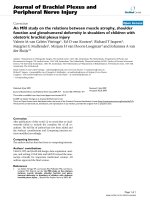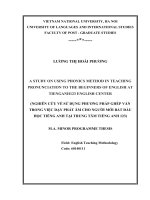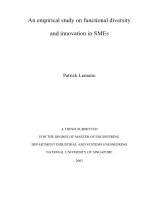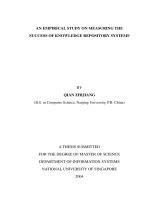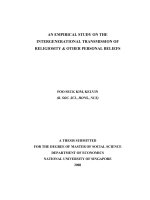Costs and benefits of business government relations an explorative study on a firm¿s perceived influence on law and regulation in transition economies
Bạn đang xem bản rút gọn của tài liệu. Xem và tải ngay bản đầy đủ của tài liệu tại đây (1.15 MB, 51 trang )
Costs and Benefits of Business-Government Relations: An Explorative Study on a Firm’s
Perceived Influence on Law and Regulation in Transition Economies
Szeto Kit Ying
(B.A. in Management, HKPolyU)
A THESIS SUBMITTED
FOR THE DEGREE OF MASTER OF BUSINESS
DEPARTMENT OF STRATEGY AND POLICY
NUS BUSINESS SCHOOL
NATIONAL UNIVERSITY OF SINGAPORE
2012
1
ACKNOWLEDGEMENTS
This thesis would not have been possible without the guidance and the help of
several individuals who in one way or another contributed and extended their valuable
assistance in the preparation and completion of this study.
First and foremost, my utmost gratitude to my supervisor, Dr. Kim Young-Choon,
whose sincerity, encouragement and constant guidance I will never forget. I am deeply
grateful to my previous mentor, Dr. Andrew Delios, for giving me the initiative to begin this
study. In addition, I would like to thank instructor, Tobias Hofmann, fellow classmates in my
Comparative Political Economy class and participants in 2011 JMS Conference in Hong Kong
for the insightful comments and advices on the previous version of this study.
Lastly, my parents receive my thankfulness and love for their dedication and support
during my studies.
2
Table of Contents
CHAPTER 1 INTRODUCTION .................................................................................................... 1
CHAPTER 2 BACKGROUND AND LITERATURE REVIEW ............................................................ 4
2.1 Transition Economies .................................................................................................... 4
2.1.1 Countries in Transition ........................................................................................... 4
2.1.2 Process of Economy Transition ............................................................................... 5
2.1.3 The Role of Government in Transition Economies.................................................. 6
2.2 Purposes of Business-Government Relations ................................................................ 7
2.3 Comparison with Previous Studies .............................................................................. 10
CHAPTER 3 HYPOTHESES DEVELOPMENT ............................................................................. 12
3.1 Building Relationships with Policy-Making Politicians ................................................ 12
3.2 Dealing with Government Officials ............................................................................. 15
3.3 Influence of Business-Government Relations .............................................................. 17
CHAPTER 4 METHODS ........................................................................................................... 19
4.1 Data and Sample ......................................................................................................... 19
4.2 Variables and Measures .............................................................................................. 20
4.3 Method of Analysis ...................................................................................................... 25
CHAPTER 5 RESULTS AND INTERPRETATIONS....................................................................... 28
5.1 Providing Support to Policy-Making Politicians .......................................................... 28
5.2 Dealing with Operating Government Officials ............................................................ 30
5.3 Impact on Firm Behavior ............................................................................................. 31
CHAPTER 6 DISCUSSION AND CONCLUSION ......................................................................... 32
6.1 Discussion .................................................................................................................... 32
6.2 Limitations and Further Studies .................................................................................. 34
6.3 Conclusion ................................................................................................................... 36
REFERENCES .......................................................................................................................... 37
APPENDIX .............................................................................................................................. 41
i
SUMMARY
This paper combines perspectives of business strategy and political science scholars
to study the costs, benefits and potential long-term effects of building business
government relation. Drawing on resource dependence theory and power
dependence theory, I develop hypotheses on how firms build business-government
relation through providing a stable economy, for example hiring more employees
than needed and keeping tax revenues high, and how business government
relation helps firms to deal with government officials easier and can, in turn, pay
less bribes and enjoy lower operating costs. This paper also looks at the impact of
business government relation on firm’s subsequent investment and divestment
behaviors. The hypotheses are tested by firm-level data in 25 transition economies.
Empirical results show that firms reporting more tax and hire more unnecessary
employees have stronger relation with government, i.e. are more capable in
influencing policies and regulations related to their businesses. Firms with strong
relation with government pay less bribery to government officials to get things
done and to secure government contracts. Moreover, firms with strong relation
with government are less likely to alter their production mix, which implies they are
less likely to involve in innovations and new investment. Therefore, when building
and maintaining business-government relation, firms should ensure that they can
balance the costs and benefits in order to maintain reasonable future development.
ii
LIST OF TABLES
Table 1: List of Transitioning Economies ............................................................................... 41
Table 2: Summary statistics .................................................................................................. 42
Table 3: Correlation Matrix ................................................................................................... 43
Table 4: Tax Compliance, Excess Labor and Business Government Relations ...................... 44
Table 5: Business Government Relation and Costs in Dealing with Government Officials .. 45
Table 6: Business Government Relations and Firm Behavior ............................................... 46
iii
CHAPTER 1 INTRODUCTION
It has been widely accepted that firms receive economic benefit through
building and maintaining a good relationship with their governments (Bertrand,
Kramarz, Schoar, & Thesmar, 2004; Faccio, 2006; Johnson & Mitton, 2003; Li, Meng,
Wang, & Zhou, 2008). Previous research suggests that business-government
relations help firms in various ways: securing of favorable regulatory conditions
(Agrawal & Knoeber, 2001) and access to resources, such as bank loans (Faccio,
2006; Khwaja & Mian, 2005). Yet few studies look into how business-government
relations influence firms’ future development. In this study, I will look into the costs
of and benefits from building business-government relations with incumbent
politicians and bureaucrats, and then I will analyze whether and how businessgovernment relations influence firms’ decisions on future development.
In studying business-government relations, business strategy scholars
mainly talk about why business-government relations are important, what benefits
firms can extract from them, and through what mechanisms these benefits can be
obtained. Concerning costs of building government relations, business strategy
scholars mostly limit themselves to activities that are easily visible and directly
pointing to political connection building, such as social activities (drinking and
dining) and bribery activities, and these activities mostly contribute to the receivers’
personal pocket. Political science researchers on the other hand suggest that
incumbent politicians expect something else from businessmen. One thing that
1
politicians want and businessmen can give is economic stability since it can help
politicians to extend their tenure. To achieve optimum cost-effective operation and
maximize profits, it is usual for firms to avoid redundant head counts and use
strategic accounting to minimize tax payable. In order to maintain economic
stability, firms can help reduce unemployment rates through excessive hiring and
increase government income through paying more tax by reducing the amount of
strategic accounting. By doing so, firms build stronger relationships with incumbent
politicians and bureaucrats and thus become more powerful in influencing changes
to laws and regulations that may have an important impact on their businesses.
This phenomenon is more apparent in transition economies since these
countries undergo a series of changes and their governments target economic
growth, thus providing more opportunities for firms and government officials to
engage in exchange behavior. Hence, the transition process makes businessgovernment relations an important topic in transition economies. Moreover, as
transition economies have become more and more important in the global market
and gain a lot of investor attention from all over the world, it is important to
understand how the business-government relationship functions in these fast
growing economies and understand how such relation influences firms’ behavior
and development in the long run.
Linking discussions on business-government relations from a business
strategy perspective and political science perspective, this paper reveals some
2
government relation building costs that business scholars have long ignored and
discusses, besides being able to influence government policies and regulations,
some potential benefits that government relations can offer firms. The ultimate
goal of this paper is to highlight the influence of business-government relations on
firm behavior rather than only focus on the immediate economic or financial
outcomes as in previous research. Understanding whether and how businessgovernment relations impact firm behavior and its subsequent development can
generate better knowledge of the long-term effect of such relations and lead to the
discussion of whether and when business-government relations are worth building.
The structure of this paper is as follows. Chapter 2 will review the
background and literature review on transition economies and businessgovernment relations. Based on the literature review in Chapter 2, Chapter 3 will
develop several testable hypotheses on the topic of interest. In Chapter 4, I will
present the methodology of the study. Chapter 5 reports the results of empirical
analysis. Finally, in Chapter 6, I will discuss the findings, limitations and future
research direction, and conclude the paper.
3
CHAPTER 2 BACKGROUND AND LITERATURE REVIEW
This section will provide definitions, background and previous research
relevant to business-government relations and transition economies. By reviewing
these studies, this section will highlight the importance of studying businessgovernment relations in transition markets and how business-government relations
impact firm behavior in the long run. In this section, I will begin with the definition
and process of transition economies and then discuss the roles of government in
transition economies. Then, I will discuss the purposes of building businessgovernment relations and how such relations are built. Finally, I will discuss how
this paper is different from previous research studying business-government
relations and highlight the potential contributions of this paper.
2.1 Transition Economies
2.1.1 Countries in Transition
A transition economy is one that is transforming from a centrally planned
economy to market economy. While researchers studying transition economies
always focus on countries in Central and Eastern Europe and the Former Soviet
Union, the term “transition economies” indeed has a broader meaning than this.
Countries which are outside Europe and transforming from a socialist-type
command economy to a market-based economy, for example China, are also
members of transition economies. In a study published in 2000, the International
4
Monetary Fund lists 29 countries as transition economies in four regional
categories (see Table 1) (IMF, 2000).
--------------------------------Insert Table 1 here
--------------------------------In 2002, the World Bank added Bosnia and Herzegovina, and Serbia and
Montenegro to the transition economies list (WorldBank, 2002a). Every now and
then, IMF, the World Bank and some other economic monitoring organizations add
and drop countries into and from the transition economies country list according to
their economic environmental characteristics. Thus, before going into the study, we
need to understand the process of market economy transformation and the roles
of government in this process.
2.1.2 Process of Economy Transition
Based on Fischer and Gelb (1991), the IMF (2000) summarizes the following as
components of the transition process: Liberalization, Macroeconomic stabilization,
Restructuring and privatization, and Legal and institutional reforms. Liberalization
refers to the transformation from controlled markets to free markets. This process
includes allowing markets to determine most of the prices and lowering trade
barriers that would inhibit contact with the price structure of the world’s market
economies.
Market liberalization opens up originally sealed markets and encourages
investments from both domestic and world markets. The sudden increase in
5
investment creates an inflation surge (Ghosh, 1997); thus governments need to be
disciplined over budget as well as fiscal and monetary policies in order to contain
the inflation rate and this process is Macroeconomic stabilization (Debrun and
Kapoor, 2010).
Restructuring and privatization refer to the processes of establishing
feasible financial institutions and reforming the enterprises in these economies
such that the ownership of these enterprises can be transferred into private hands.
Finally, these countries need to undergo legal and institutional reforms in order to
redefine the role of the state in these economies, formulate laws and regulations,
and introduce appropriate competition policies to achieve natural market
efficiency.
2.1.3 The Role of Government in Transition Economies
While in the developed world, economists expect governments to take a
limited role and allow the market to operate itself, countries which are in market
economy transformation cannot take a similar approach as their more developed
counterparts. In his paper based on the case of China, one of the large transition
economies, Liou (1998) summarizes five major roles of government in the process
of economic development: protector of citizen, distributor of income, manager of
economy and business, regulator of industry, and promoter of growth.
As protectors, governments need public policies to protect citizens and
businesses from hostile social unrest, hostile international relations and illegitimate
6
political appropriation. Only by doing so, can governments provide a peaceful and
stable domestic environment for businesses to operate in and for the economy to
grow. As distributors, governments need to balance classes and regional income
inequality and to redistribute through formulating and implementing social welfare
policies and initiating development projects in rural areas where its residents
usually have relatively low incomes compared to people living in the urban area. A
stable economic environment is a crucial factor for economic growth. To assure a
safe and stable economic environment, governments need to adjust monetary
policy and fiscal policy in order to minimize both the unemployment rate and
inflation rate as a high unemployment rate creates burden for social welfare
systems and a high inflation rate deters investment. In economic transition
countries, private property rights are usually not protected. During the process of
transition, governments begin to formulate and test rules and regulations to create
an environment in which business can operate and individuals’ rights are
sufficiently protected. The final role of governments in transition economies is to
act as promoters of economic growth and social development. To promote
economic growth, governments need to implement public policies to invest in
public infrastructure and to promote the development of business sectors in both
domestic and international markets.
2.2 Purposes of Business-Government Relations
For the five government roles mentioned above, three of them are related
to this study, they are manager of economy and business, regulator of industry,
7
and promoter of growth. The manager role explains why policy-making politicians
want to build cooperative relationships with firms and the other two explain why
firms want to establish relations with those politicians.
Business-government relations are a form of benefit exchange, and both
firms and politicians are involved in such exchange for some reasons. There are
several reasons for policy-making politicians to establish relationships with
particular firms. Corruption in terms of bribery, i.e. benefits that go right into
politicians’ personal pocket, is an obvious but illegal reason and mechanism why
and how politicians are involved in personal business-government relations (UNDP,
2003). In this study, however, corruption involving high-level officials is not the
major focus; instead, this study will look at how the economy manager role of
transition economy governments drives their high-level officials to establish
business-government relations with firms.
Since people, investors and the rest of the world use economic
development as one of the important benchmarks to evaluate the achievement of
a government, an incumbent government, especially one that targets economic
transformation and rapid growth, would therefore attempt to fulfill the roles
proposed by Liou (1998). Tenure and promotion of policy-making government
officials and politicians are highly associated with economic growth. In countries
with voting systems, it is obvious to expect citizens to favor the incumbent
government when the economy is booming and this explains why government
officials care about the economic environment. Unexpectedly, for countries
8
without voting systems, even countries with only one political party, such as China,
the story is more or less the same. In China for example, the Central government
formulates national economic growth targets every year and distributes the target
down to the provincial level and so on. Therefore, each province, each town and
each regional industry has its own yearly target. At the end of each year, provincial,
township and regional industrial leaders’ achievements are evaluated against the
targets. In about every five years, the Central government evaluates these leaders’
overall performance and decides whether they should stay, get promotion or be
kicked out of the game. Guo’s (2009) study finds evidence that Chinese regional
leaders do respond to the performance evaluation by stimulating economic growth
through increasing public expenditure.
Mr. Vito Tanzi, Director of the IMF’s Fiscal Affairs Department, comments
that “the transformation to a market economy is not complete until functioning
fiscal institutions and reasonable and affordable expenditure programs, including
basic social safety nets for the unemployed, the sick, and the elderly, are in place.
Spending programs must be financed from public revenues generated—through
taxation—without imposing excessive burdens on the private sector” (Tanzi, 1999).
Thus, the level of tax revenue is another indicator of government officials’
performance.
To achieve outstanding performance in growth and successfully transform
the economy, governments need firms to hire, invest and pay tax. As firms
9
continue to hire and invest, the unemployment rate goes down and government
income, i.e. tax revenue, increases, and, in turn, regional leaders’ appraisal scores
go up. Thus, tenure extension and promotion can be expected.
When transforming from socialist economies to market economies,
countries go through a long experimenting process to see how the market works
best and how to stimulate the economy to grow faster. During such process, there
are a lot of regulations and deregulations, and governments formulate various sets
of economy boosting policies. Thus, this process provides a good opportunity for
firms to influence their governments to formulate regulations and policies that are
favorable for their businesses to operate in.
2.3 Comparison with Previous Studies
In business and economic fields, scholars studying business-government
relations mostly start from firms’ perspective. Thus, this line of study pays more
attention to what firms can get from the relation while putting less effort into
understanding what firms need to pay in return (Frye, 2002). Previous research has
found that building relationships with government can help firms to create a
favorable business environment (Agrawal & Knoeber, 2001) and to access
resources such as bank loans (Faccio, 2006; Khwaja & Mian, 2005). Li and his
colleagues (2008) explored whether political affiliation can help firm owners in
China to borrow more money from banks and they found a positive relationship
between the two.
10
In terms of what firms need to pay in order to build government relations,
business scholars mainly focus on various forms of corruption, such as gifts, bribery
or entertainment expenses (Cai, Fang & Yu, 2005). In the political science field,
scholars do explore other ways that firms can use to build relationships with toplevel officials; however, this line of study focuses on the behavior of the firms and
its influence on politicians while paying less attention to what happens to firms
afterwards (Bertrand et al., 2004; Gehlbach, 2006). This paper combines the two
perspectives, business strategy and political science, and attempts to explore the
relationship between firms’ contribution to economic development and firms’
relationships with government.
11
CHAPTER 3 HYPOTHESES DEVELOPMENT
In advancing the study of business-government relations at firm level, a
number of research questions can be asked: 1) what does it take for firms to build
relations with governments, in particular incumbent politicians and top-level,
policy-making bureaucrats? 2) What benefits can firms get besides being able to
influence regulations and policies which concern them? And 3) what are the
consequences in the long run; in particular whether and how business-government
relations influence firm behavior and development? In this part, we will look at
these three questions and develop related hypotheses.
3.1 Building Relationships with Policy-Making Politicians
Many business strategy scholars use resource dependence theory (Pfeffer &
Salancik, 2003) to explain the business-government relationship and discuss various
ways used by firms to manage this relationship. According to this perspective, all
organizations, including business firms situated in an open system, are dependent
on external resources for survival and growth. Government is definitely one of the
most important sources of external resources in transition economies. Due to the
“institutional voids” prevailing in the transition economies, which are characterized
by the absence of well-developed regulatory systems and the dearth of wellfunctioning contract-enforcing mechanisms and intermediaries in product, labor
and capital markets (Khanna, Palepu, & Sinha, 2005), government agencies control
more resources and discretionary power and create more uncertainties for
12
business activities than their developed economy counterparts. When the
institutional environment is less predictable, business-government relations help
firms to cope with policy changes and even allows firms to influence such changes
to favor their operations (Agrawal & Knoeber, 2001). Therefore, businessgovernment relations, or political connections, are very important in transition
markets. Scholars studying business-government relations from the business
perspective always emphasize what firms can extract from such relations while
paying less attention to what firms need to pay in return; however, firms do not
receive benefits from government without paying anything back (Frye, 2002). Even
if some scholars try to delineate the costs of building government relations, topics
are mainly limited to visible ones, such as bribery and entertainment expenses.
Although resource dependence theory (Pfeffer & Salancik, 2003) highlights
a mutual dependency relationship, most business strategy scholars take it as a oneway relationship by only looking at what firms can get from government but
ignoring what resources governments depend on that can be provided by business
entities. From evidence around the world, it is clear that business-government
relations are a form of “exchange” between firms and politicians. In such exchange,
economic rewards are transferred to firms and then firms offer politicians with
politically-valuable services in return. One thing that government or incumbent
politicians want and the business sector can give is economic stability (Quinn &
Woolley, 2001). Economic stability is crucial to a government because it is highly
related to tenure of incumbent politicians who are running the government right
13
now. For instance, the Pro-Russian party, a political party that is believed to be
unpopular in Latvia, a country which is trying to distance itself from its communist
past subsequent to its independence from Russia, wins Latvian elections because
the previous government did not do well when it faced a financial crisis (Buehrer,
2011). Bertrand et al. (2004) find that business leaders from politically connected
firms in France create more jobs to build “re-election favors” for incumbent
politicians.
Other than that, politicians also expect a certain form of financial support
from politically connected firms, such as political contribution or tax revenue. In
the 1990s, politically connected Russian businesses were more likely to be subject
to price controls and more frequent inspections because it was beneficial to
politicians (Frye, 2002). Not just politicians require payback from firms, but firms
are willing to give as well. According to Gehlbach’s (2006) study on the tax
compliance of firms in Eastern Europe and in the former Soviet Union, firms hide
revenue from tax authorities is associate with the firm-level satisfaction with stateprovided goods and services. Since larger and politically connected firms receive
better service from the government, they are less willing to hide revenue, i.e. they
are willing to pay more tax.
Firms help politicians to stay in power through excessive hiring and pay
more tax and, thus, enjoy the privilege of being influential over government
policies and regulations that they are interested in. More contribution from the
14
focal firm, i.e. spending more on maintaining a stable economy, would therefore
lead to a stronger relationship with incumbent politicians and bureaucrats, i.e.
higher level of influential power.
H1: The more firms contribute to the national economy (from a
government perspective), the stronger business-government
relations they are likely to have.
3.2 Dealing with Government Officials
In China, firms with political connections enjoy higher bank loans, have
access to more capital sources and can borrow capital cheaper when compared
with their non-connected counterparts (Li et al., 2008). Pakistan shows the same
evidence (Khwaja & Mian, 2005). The difference in access to capital is due to the
lending practice of state-owned banks and this difference increases as businessgovernment relations grow stronger (Brandt & Li, 2003; Che, 2002). A crossnational study shows that firms with controlling shareholders or top managers who
are members of legislatures or national governments enjoy easier access to debt
financing and lower taxation (Faccio, 2006). Thus, firms which do not have such
political connections might need to bribe their way out.
In transition countries where institutions are absent and government
operating procedures are not so transparent, government officials can easily get in
the way of business operations as they virtually have full control of licensing and
government contract bidding. For politicians and top-level bureaucrats who are
15
already benefiting from firms’ contribution in lowering the unemployment rate and
increasing tax revenue, they cannot be too aggressive when taking personal
financial benefits from these firms since they may risk losing support from these
firms. For lower-level government officials whose tenure and promotion are less
related to economic environment, they are more likely to seek personal benefits,
i.e. bribes, from firms when firms are looking up to them for all kinds of licensing
and government contract bidding. As there are few institutions or monitoring
mechanisms in transition countries to monitor operating government officials, the
relationship between these officials and business firms is particularly imbalanced.
To balance an imbalanced dyadic relation, we can introduce an additional actor as
any two actors in a triadic relation can form a coalition to act against the third actor
(Emerson, 1962). Therefore, firms may build good relationships with politicians and
top-level bureaucrats who make decisions on policy changes and, more importantly,
“rule” the low-level government officials who implement policies and procedures.
Since policy-making politicians usually are supervisors of lower-level operating
government officials, firms having strong relations with these politicians have
relatively stronger bargaining power than firms which do not have such relations
when dealing with low-level government officials. For the above reasons, firms
which contribute more and have stronger relations with government may be able
to pay lower bribes to government officials and have higher priority in the line
when waiting for some administrative work to be done. Therefore, I hypothesize
16
that firms with stronger business-government relations are likely to have lower
costs in dealing with government officials.
H2: The stronger business-government relation firms have, the
lower the costs they need to pay when dealing with government
officials.
3.3 Influence of Business-Government Relations
In previous sections, we discussed how firms build and maintain relations
with politicians and government through providing a stable economy, and how
firms may benefit from these relations when they need to deal with government
officials. It is expected that firms benefitting from lowered costs of business and a
less competitive environment will transform these advantages into opportunities
for growth and investment. On one hand, firms with strong government relations
do benefit from those advantages. On the other hand, however, these relations do
not come for free and firms need to pay certain costs to build and maintain these
relations. In the first hypothesis, I considered tax compliance and excessive hiring
costs for building and maintain government relations. Paying more tax means that
firms are left with less profit, and hiring more redundant employees means that
firms are more inefficient and the payroll is relatively high compared to firms’ sales.
As a result, building business-government relations through contributing to
national economies could result in firms making less profit and thus having less
money left to put into innovation and reinvestment.
17
Having strong government relations means that firms are capable of
influencing policies and regulations in their industry and the regions that they
operate in, so they can create a relatively less competitive environment and the
approaching monopoly environment usually hinders motivation in investing in
innovation. Moreover, the relations built are usually location and industry-specific
as firms’ contributions to the economy are mainly observed by politicians and
bureaucrats who are working in that specific geographical and industrial area.
When firms move outside their attached geographical and industrial areas, the
benefits they can get from the relations built diminish or even disappear. Thus
firms with established relationships with politicians and bureaucrats have less
incentive and motivation to innovate or diversify than other firms without such
relations. Therefore, I argue that firms with strong government relations are less
likely to alter their production lines and production plants.
H3: Firms with stronger business-government relations are less
likely to restructure their production mix.
18
CHAPTER 4 METHODS
4.1 Data and Sample
To test the costs and benefits of business-government relations and further
analyze its impact on firm development, I use data from World Bank’s Enterprise
Surveys (WorldBank, 2002b). The Enterprise Surveys consist of data from over
120,000 manufacturing and service providing firms in 125 developing countries.
The dataset has been used in other research, such as in entrepreneurship (e.g.
Muravyev, Talavera, & Schafer, 2009) and in corruption (e.g. Kenny & Soreide,
2008). As business-government relations are still a sensitive topic in many countries
especially when there are questions about bribes and gifts that firms give to
government officials, not all participating firms reveal their information on this
topic. The survey used, however, attempts to solve this problem by asking sensitive
questions indirectly. Questions concerning sensitive activities require respondents
to comment on a hypothetical similar firm rather than admitting that the firms
have engaged in these activities.
Although the World Bank Group conducts the Enterprise Surveys (WEBS)
every three years since 2002, in 2006 it changed the questionnaire dramatically so
that some constructs of interest in this study are omitted. Thus I can only use
survey data from 2002 to 2006. This paper focuses on transition economies. The
empirical analysis includes all the 25 transition economies surveyed by WEBS:
Armenia, Azerbaijan, Belarus, Bosnia and Herzegovina, Bulgaria, China, Croatia,
19
Czech Republic, Estonia, Georgia, Hungary, Kazakhstan, Kyrgyz Republic, Latvia,
Lithuania, Moldova, Poland, Romania, Russian Federation, Serbia and Montenegro,
Slovenia, Tajikistan, Ukraine, and Uzbekistan. After dropping observations with
meaningless values and missing key independent variables, there are 5,094
observations from 25 industries.
To increase data quality, WEBS was conducted through face-to-face
interviews with company managers and owners. However, as some questions in
the surveys like bribery activities, ability to affect government policies, and
investment activities of firms are sensitive questions, the number of firms that
responded to all these sensitive questions was smaller than the number of
respondents. I conducted a standard mean comparison test to assess the nonresponse bias and found that non-response bias happens across countries but not
within countries. Thus, the inclusion of a country dummy variable can potentially
solve the problem. I also used logistic regression models to control for baseline
information to estimate the probability of response for each dependent variable.
The reciprocals of these probabilities are used as non-responding weights in the
empirical analysis.
4.2 Variables and Measures
In the first stage analysis, I study the relationship between firms’
involvement in maintaining a stable economy and strength of business-government
relations. The dependent variable, business-government relations, measures firm-
20

